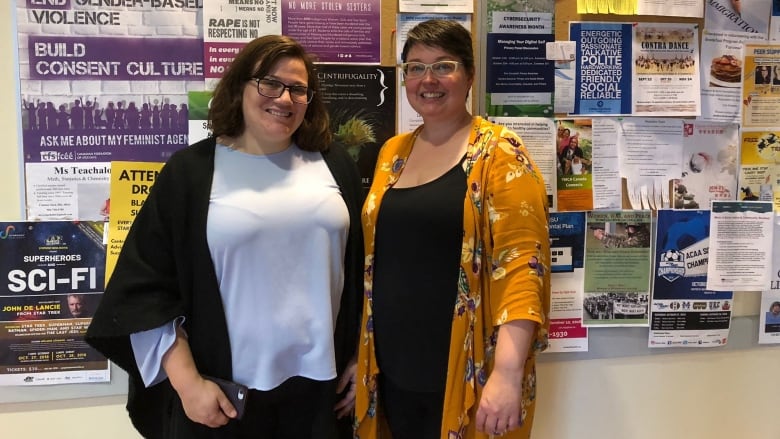Abortion doula training offered to help fill gap in health care
'It's a medical procedure and we wouldn't send somebody to get a heart operation without any support'

A group of women were trained Saturday on how to best support a woman going through a medical or surgical abortion.
The training was offered at Mount Saint Vincent University. It was organized by the university's feminist collective.
"It's teaching people how to centre their clients, how to be non-judgmental, how to see trauma for what it is and how it would express itself, and be able to work within that," said Shannon Hardy, the co-ordinator of Abortion Support Services Atlantic and trainer for the event.
She's a full-spectrum doula and offers abortion doula training sessions across Canada.
Seeking support
"Abortion being very stigmatized, many people don't have support and feel like they can't go to their family, and feel like there is nobody that they can talk to about their needs for this particular procedure," said Hardy.
"So having a group like abortion support services and doulas allows you to reach out to somebody for the support you need in a non-judgmental and in a wholly supportive way."
An abortion doula is trained in understanding trauma, the importance of language, access to reproductive care, physical and emotional support, and more.
Understanding trauma
"Trauma isn't an event," Hardy said. "It's a wound that people experience after the event. In the context of abortion, trauma can be that there's no support, that it's stigmatized, or it could be a wanted pregnancy and you need to terminate."
This is the second training to take place in Halifax, which Hardy believes help fills a gap in the health-care system.
"The medical system is often not trauma-informed," she said. "It's about getting people in, doing the procedure, and then discharging people. And that's not to say that all medical professionals are not trauma-informed. Our medical system isn't.
"Having people who are only there to support a patient or client is so important because the system is not designed this way."
'Support is support'
One of the people who attended and helped host the session was Catherine Chamberlain, a social work student and birth doula.
She says many people know what a birth doula is — someone who supports the mother, emotionally and mentally, through childbirth and pregnancy — and that the role isn't all that different from being an abortion doula.
"I don't really know why we can't seem to make that connection between supporting someone through birth and supporting someone through abortion," said Chamberlain. "Support is support. But we have these societal pressures that abortion is wrong or abortion is taboo.
"It's a medical procedure and we wouldn't send somebody to get a heart operation without any support, so why would we do that to somebody who's having just a different type of medical procedure?"
Making the training more accessible
Eight people attended the event and each had to pay $100 for a two-day session, compared to birth doula training sessions that charge $400.
"In order to make it as accessible as possible I do try and ask people to set up their prices in a way that everybody can access it and to hold it in places that aren't necessarily Halifax-centric, and to have it held in places that are easier to get to," said Hardy.
The MSVU feminist collective is looking to plan more abortion doula training sessions in future.

